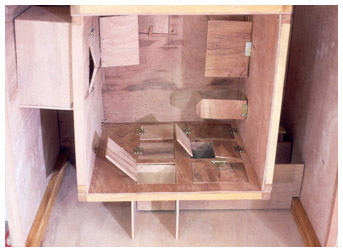


 |


launch interview with Marepe
The work of Marepe (Marcos Reis Peixoto) resides in a conceptual border zone between the utilitarian and the poetic, where everyday objects from his environment in Bahia are transformed through artistic intervention. Living and working in this northeastern region of Brazil, an area economically less robust than the metropolitan centers of São Paulo and Rio de Janeiro, Marepe infuses his work with the area's culturally specific hybrid of African and European traditions. A sculptor by training, Marepe invokes in his methodology both the influence of Marcel Duchamp's readymade and the challenges to the barriers between art and life launched by the Brazilian Neo-concretists of the 1950s and 1960s. In Marepe's case, however, the transformative gesture of the Duchampian readymade takes on a social and poetic significance that calls into question the institutional status of the art object while simultaneously investing everyday objects with an almost spiritual power.
In keeping with this agenda, Marepe often humorously refers to his sculptures as necessaires, or necessities, rather than readymades, in order to emphasize their social origins. He brings forward the intimate connections of these objects to the subsistence economy of rural Brazil rather than to centers of industrialized production. The materials that he appropriates for these works include such items as commercially available ceramic water filters (a mainstay of life in rural Brazil), wash basins, street salesmen's suitcases, and trouxa (bundled packages) that are used as lunch boxes or to carry laundry. In Marepe's hands, these everyday objects undergo a transformation. In Cabeça Acústica (Acoustic Head) (1995), for example, the artist brings together two wash basins connected with hinges and a cooking pan to create a meditative isolation chamber for amplifying singing (an aspect of Brazilian cultural identity that is particularly strong in Bahia). In Os Filtros (1999), Marepe takes a common brand of ceramic water filters and elongates them so that they begin to seem strange. While this work addresses the lack of potable water in the Brazilian countryside, it also becomes a poetic metaphor for purification and personal cleansing as spectators drink the filtered water. Drawing on the legacy of an earlier generation of Brazilian artists, including Lygia Clark, Marepe emphasizes that he does not consider his works complete until they are used and acted upon by the public.
Marepe has been the subject of solo exhibitions at Galeria Luisa Strina, São Paulo, Brazil (2002), and Galeria Acbeu, Salvador, Brazil (1995). His work has also been included in a number of group exhibitions, including the XXV Bienal de São Paulo (2002); The Thread Unraveled at Museo del Barrio, New York, New York (2001); and the Museo Nacional Centro de Arte Reina Sofía, Madrid, Spain (2000).
--Douglas Fogle











